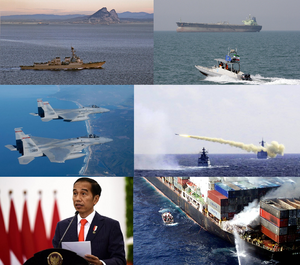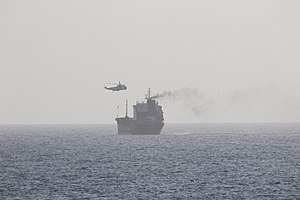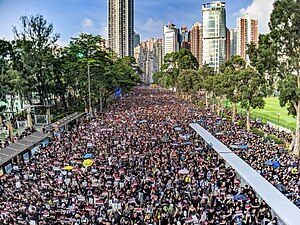Tarijar Strait Crisis
| Tarijar Strait Crisis | |||||
|---|---|---|---|---|---|
 Clockwise from top left: The ANV Bellesar sails through the Tarijar Strait; a Zalluabed-crewed patrol boat observes the Caspian-flagged CCV Firestay cargo vessel; Qolaysian naval vessels conduct live-fire exercises; the Kuresan cargo vessel KCS Hirsate after being struck by a Zalluabed missile on November 27th; Abiel Kennard, President of Qolaysia, demands the withdrawl of Drambenburgian forces from Leonrau; Emmirian Z-14 Ospreys patrol the Strait | |||||
| |||||
| Belligerents | |||||
|
|
| ||||
| Commanders and leaders | |||||
|
|
| ||||
| Casualties and losses | |||||
|
Albarine
Emmiria
|
Drambenburg
| ||||
|
| |||||
The 2020 Tarijar Strait crisis was an intensification of military tensions between the W.E.D.A. member states of Albarine and Emmiria and their allies of C.A.M.D.A. member states and Drambenburg and their allies in the Southern Adula region, specifically Buckingla and Zalluabed. The crisis began on November 25th, 2020, after Drambenburg was granted land grants by Zalluabed and Buckingla to construct military bases in their countries. This was seen as a threat by Albarine, who addressed concerns that the movement of Drambenburgian warships through the heavily traversed Tarijar Strait from the Toyana Ocean into the Albarine Sea threatened international shipping. In response, the Royal Zalluabed Navy sent four naval vessels into the Emmiria Sea as a show of force. At this point, multiple nations began taking sides, with Drambenburg's other regional ally Qolaysia also threatening to send forces. The Coalition of Crown Albatross Security Council met in Tofino, Zamastan, raising concerns of a conflict erupting in the region. Zalluabedi forces eventually stood down, and as international tensions calmed, Drambenburgian ships were allowed to sail through the strait.
The crisis intensified in mid-December as the Drambenburgian government covered up the shootdown of a Drambenburgian fighter jet by pirates, using the vagueness of the event as justification to send a quarter-million troops to Leonrau, Qolaysia, against the government's wishes. As the international community condemned Drambenburg and protests erupted over the presence of foreign soldiers occupying the capital of Qolaysia, the Z.I.S. released their findings from their investigation of the shootdown. The revamped pressure and the disbanding of the Qolaysian military by Abiel Kennard forced Chancellor Walde Herzog to repeal his forces on December 19th.
Background
Drambenburg military leases
On November 23rd, 2020, the governments of Buckingla and Zalluabed came to an agreement with the government of Drambenburg for them to construct military bases in multiple locations in each country. In Zalluabed, the Drambenburgian navy would be given access to seven drydock ports in the capital of Zakaraban, as well as a sector of the King Aziz International Airport deticated to the Drambenburgian air force and army. In Buckingla, Drambenburg would be allotted two airfields for their airforce, as well as two military installations in the capital of Bucking and the port city of Paradau. Both instances of the contracts were criticized immediately by the government of Albarine, who saw the move as constricting and surrounding their territory in a key move to antagonize the Albarine sovereignty.
Albarine, Buckingla, and Zalluabed were historical rivals, but specifically worrisome to Albarine security experts was the fact that foreign military movement would increase significantly through the Tarijar Strait; the narrow waterway connecting the Albarine Sea and the Emmiria Sea, which was the main passage for Drambenburgian vessels to reach ports in Buckingla. The waterway, a key trade route and one of the busiest traversed international shipping lanes in the world, only 12 miles at its narrowest point, was controlled by Albarine and Emmiria. Both governments had long maintained that no military presence besides necessary mobility and occasional patrol and checks would ever take place in the strait, so the prospect of foreign military equipment moving freely through the waterway was of great concern to both governments.
On November 24th, Chancellor Sadie Melhaven of Albarine formally condemned Drambenburg and the governments of Buckingla and Zalluabed, calling for them to "rescind their leases for the military bases and avoid the Strait at all costs," saying further that "the sanctity of free and safe international shipping is at risk, as well as the sovereignty of the Albarinean coastal waters."
Crisis
After Albarine's government released the condemnation of Drambenburg's military movement, Zalluabed's King Farik al-Jamura declared that the government of Zalluabed would "stand for our ally" and ordered the Royal Zalluabed Navy to send a detachment of ships into the Strait as a show of force. On November 25th, the crisis officially began when the Zalluabed fleet, consistent of the RZNF Sannam, RZNF Houfaf, RZNF Tabuk, and the support vessel RZNF As-Siddiq, moved into the Strait. At this point, the government of Qolaysia also began backing the Drambenburgian movement, with President Abiel Kennard stating that the Qolaysian military was also on standby to confront any threats to either the Drambenburgian or Zalluabedi navies.
Throughout the day, regional leaders like President Khayahad al-Azari of Emmiria met with their security advisors to assess possible retaliation or diplomatic paths to solving the crisis. Al-Azari proposed a strike on the Zalluabed vessels, but was talked down by Chancellor Melhaven in a private phone call, who reportedly stated "navies have travelled through the Strait for centuries. If we retaliate forcefully, we lose peace for good. If we respond forcefully with words, we at least get to control the Strait on our adjusted terms."
The Central Adula Mutual Defense Agreement member states, led by Alcarres, Durnstaal, New Elkland, and Alonnisosa, all announced the closures of their embassies in Zalluabed and Drambenburg, citing their worries over the safety of international shipping. Alcarres President Akkin Gunaydin stated that "the lifeblood of the economies of C.A.M.D.A. relies on the connection of the Tarijar Strait. We must keep this vital chokepoint free of unnecessary war machines."
Later in the afternoon, both Albarinean and Zalluabedi officials said they were not seeking war, even as threats and counter-threats continued. King Al-Jamura downplayed the escalation, saying in comments carried on state television that "no war is going to happen," while Chancellor Melhaven said, "We fundamentally do not seek a war with Zalluabed or their partners." However, the tensions continued to climb after the Drambenburg Foreign Ministry released a statement saying "We have not made any move of aggression, merely establishing overseas military installations, which is both respected and common for major world powers. We do not recommend poking a hibernating bear, Albarine."
As the sun went down at 7 PM on the 25th of November, a squadron of three Emmirian Z-14 Ospreys intercepted the Zalluabed naval detachment, at one point flying within 100 yards of the RZNF Sannam and exchanging radio frequencies requesting that the Zalluabed fleet return to port in Zakaraban.
Tyler Guterres, President of the Security Council of the Coalition of Crown Albatross summoned the 15 member states of the Security Council to address the crisis, which was complicated by the fact that the Coalition was not in session and 11 of the 15 delegates were not in Tofino at the time of the summon. The security council would not meet as a group until two days later, further delayed because of conditions caused by Tropical Storm Isabella.
Drambenburg fleet arrives

The contingent of the Drambenburgian navy en-route to Paradau, Buckingla, reached the opening of the Strait on November 26th. The fleet, helmed by the aircraft carrier KTF Katherine von Wettin accompanied by 8 other ships including 4 frigates, 2 corvettes, and 2 support vessels. The Albarine government and Drambenburg concluded that the fleet could sail through the Strait with an Albarinean and Emmirian escort to assure a peaceful transition.
Boarding of the ANV Cirsio Cloud
The Zalluabed navy contingent, shortly after the Drambenburg fleet completed its traverse through the Strait, backed further out to open water in the Emmiria Sea. However, during their movement out to sea, they accidentally crossed into international shipping lanes in settling fog where the Caspian-flagged CCV Firestay cargo vessel came within 50 yards of impacting the RZNF Houfaf. The incident caused alarm from the Zalluabed navy, which dispatched two gunboats to follow the vessel and make sure it stayed away from the Zalluabed fleet.

Albarine's government, in an effort to deter the Zalluabed navy's movement, sent the ANV Bellesar warship and the ANV Cirsio Cloud tanker to intercept the Zalluabed vessels. The situation escalated dramatically, with the RZNF As-Siddiq bisecting the two Albarinean vessels in a sever-movement in between them, allowing for a Zalluabed marine helicopter to hover over the ANV Cirsio Cloud. Zalluabed marines boarded the tanker, and while they did not take control of the vessel or fight with the crew, the incident caused the crisis to escalate even further now that military-owned ships had been boarded by a foreign power.
On November 28th, after three days of Zalluabed Naval vessels being in the Strait, President Akkin Gunaydin of Alcarres travelled to Zakaraban to meet with Zalluabedi officials and talk them into a state of restraint. The Zalluabed navy, in a show of good faith, returned their vessels to port and allowed Albarinean forces to clear the Cirsio Cloud.
Military exercises
Zalluabedi naval forces, in a show of force, began military exercises in the Emmiria Sea in full visual lane of shipping routes for the remainder of the crisis. Zamastanian Secretary of State Jessiah Vallotis travelled to Zakaraban on behalf of President Atticus Moreau to discuss with the Zalluabedi military officials restraining their exercises. These discussions all but failed, and the Zalluabed military intensified their action. On November 27th, a Zalluabed frigate mis-calculated a missile launch and struck an international shipping vessel, the Kuresan cargo vessel KCS Hirsate, injuring dozens of sailors. A second incident on December 2nd resulted in the sinking of an Arteganaen shipping vessel, ASV Miran Day and the deaths of 12 sailors, and international pressure mounted. Zalluabed finally decided to pull back, and the government issued a formal apology to the shipping company, the government of Artegana, and offered restitution to the families of the sailors.
Qolaysian Crisis
On December 4th, a Drambenburgian fighter jet was shot down by a criminal faction known as SHADOW in the Emmiria Sea, killing the pilot and causing Chancellor Walde Herzog to order a massive deployment of 200,000 troops to the Drambenburgian naval port in Leonrau, Qolaysia. The shootdown and the perpetrators were initially covered up by Drambenburg, so the deployment was seen by many as an invasion force. President Abiel Kennard of Qolaysia was not notified of the deployment ahead of time, rather it was relayed to Qolaysian National Armed Forces command. The Qolaysian government, which by the constitution operates with limited ability aside the military, called the act a "coup", with Kennard going as far as to say the military was going to "overthrow my administration and install a Drambenburgian puppet state." Qolaysian citizens took to the street in the hundreds of thousands, denouncing the military and the Drambenburgian deployment. On December 8th, the Zamastanian Intelligence Service released their investigative findings of the shootdown, leading to nearly every member state of the C.C.A. denouncing Drambenburg and the Qolaysian military.
On December 15th, the Qolaysian government reformed the constitution to give the president full authority over the military, and President Kennard formally disbanded the QNAF's command structure and ordered Drambenburgian forces to leave. National governments started banding together to encourage Drambenburg to repeal their military presence in Qolaysia, and many international tourists were ordered by their embassies to stay indoors and protests against Drambenburg became more violent. On December 19th, amidst mounting pressure, Chancellor Herzog repealed his deployment and the forces returned to Drambenburg.
Reactions
International
- Alcarres - President Akkin Gunaydin met with the member states of CAMDA (Durnstaal, Alonnisosa, New Elkland, and Wyomia) to determine their course of action with the ongoing crisis. In a statement, he said "We are gravely concerned about today's developments, and as a major international organization with the crisis unfolding on our doorstep, we will act."
- Egilanak - President Alik Zholdoshev said that he "condemns Drambenburg's, Zalluabed's & Buckingla's actions in the region & stands with Albarine," also stating that "They will only contribute in promoting violence and militarization. They are putting unnecessary violence ahead of the goodwill of the people in the region and we should proudly stand against their actions. We hope that they actually realize what they're doing instead of militarizing for 'stability' which will probably not be the resulting factor."
- Siniapore - President Tee Hsien Moong stated on November 25th that he was "in favor of a diplomatic resolution to this unfolding crisis, although we also are concerned about the Drambenburg-Buckingla-Zalluabed decision that has been made."
- Vuswistan - Vuswistan stands with Albarine. "We are concerned about today's developments."
- Zamastan - President Atticus Moreau issued a statement on November 26th, stating that his administration was "monitoring the situation." He released a more extensive statement during a press briefing on November 30th, saying...
"the past several days have seen escalating and concerning tensions in the Emmiria Sea and the Tarijar Strait near Albarine and Emmiria. My national security team and I have taken our time to respond to the situation, but our officials have been in contact with authorities and experts on both sides of the crisis. Yesterday I spoke with Chancellor Melhaven and President al-Azari about the crisis and possible responses from this office. I advised both heads of state to practice restraint, and in a conversation with Chancellor Walde Herzog of Drambenburg, we were able to reach a conclusion to back the stance of aggressiveness. In full transparency, the Zamastanian State Department is gravely worried about the militarization of the region by Drambenburg and her allies, but the region has long been home to foreign naval bases and we are in no place to demand that Drambenburg step down. Some may see this as an allowance of their escalation, but I would argue that this mediation holds every nation accountable. Make no mistake, I will always prioritize the power and might of the Zamastanian military above all else, and so I wouldn't be lenient on the Drambenburgian fleet if I wasn't confident in our capabilities. With this said, our strike fleets across the globe have been placed on high alert, and our station in Courbagne, New Elkland, has been placed at level 5 alert status. We do not expect a conflict to erupt, but make no mistake. Zamastan will be and always is ready to retaliate. We commend Zalluabed for deciding to stand their forces down, and we appreciate their movements back to port. We hope that every action from here on out is done in a diplomatic way and military response will be extremely limited. This is for the sake of safety on the high seas and international shipping as a whole, the stability of the global economy, and the preservation of peace in this region of the world. The Tarijar Strait has long been the focal point and center of global economics and shipping, and it is in our interests to keep it that way. Drambenburgian navies sailing too and from Buckingla should be granted full access, with appropriate moderation by Albarinean and Emmirian coast guard authorities."

